Sui Dynasty (581 - 618) is a dynasty of grand unity preceding the Tang Dynasty and following the chaotic eras of Southern and Northern Dynasties. It’s the second unification in Chinese history, and it’s often regarded together with Tang Dynasty as both dynasties shared a similar culture, system, and social characteristics. Modern people often believe that the Tang Dynasty was a prosperous time; only a few can acknowledge that the flourishing Tang Dynasty was the Sui Dynasty's continuity.
|
Emperor |
Reign Title |
Reign Years |
Remark |
Mausoleum |
|
Yang Jian |
Kaihuang: 581-601 Renshou: 601- 604 |
581- 604 |
Founder of Sui Dynasty |
Tai Mausoleum in Yangling, Shaanxi |
|
Yang Guang |
Daye: 604 - 618 |
604 - 618 |
Led the Sui Dynasty to the end |
In Yangzhou, Jiangsu |
|
Yang You |
Yining: 617 |
617 |
A puppet emperor that was established by Li Yuan, the founder of the Tang Dynasty. |
Zhuang Mausoleum in Qianxian, Shaanxi |
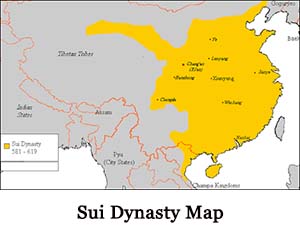 Lord Sui. In 579, the 7-year-old Emperor Jing of the Zhou Dynasty ascended the throne, and Yang Jian made his daughter Yang Lihua the empress. As the emperor himself was too young to attend the state affairs, Yang Jian acted as a regent. Two years later, Yang Jian forced Emperor Jing out of the throne and enthroned himself the emperor (later regarded as Emperor Wen of Sui Dynasty). He made Chang’an (today’s Xian) the capital city and changed the reign title to Kaihuang. Therefore, the Sui Dynasty was established. In 588, Emperor Wen sent troops to eradicate the only existing regime Chen Dynasty in the south and achieved China's unification.
Lord Sui. In 579, the 7-year-old Emperor Jing of the Zhou Dynasty ascended the throne, and Yang Jian made his daughter Yang Lihua the empress. As the emperor himself was too young to attend the state affairs, Yang Jian acted as a regent. Two years later, Yang Jian forced Emperor Jing out of the throne and enthroned himself the emperor (later regarded as Emperor Wen of Sui Dynasty). He made Chang’an (today’s Xian) the capital city and changed the reign title to Kaihuang. Therefore, the Sui Dynasty was established. In 588, Emperor Wen sent troops to eradicate the only existing regime Chen Dynasty in the south and achieved China's unification.After successfully establishing the Sui Dynasty, Emperor Wen launched a series of political, economic, and military reforms. After several years of restoration, the Sui Dynasty became rich and robust.
In terms of politics, Emperor Wen reformed the administration departments and set up three councils and six ministries to consolidate the imperial power. The three councils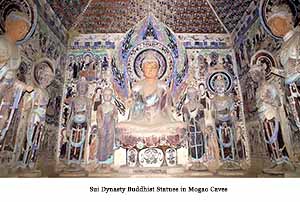 refer to Neishi, Shangshu, and Menxia, and the six ministries refer to Li, Hu, Li, Bing, Xing, and Gong. He also simplified the departments of towns and counties, which helped cut down some expenditures and improve working efficiency. The Emperor also reformed the talent screening system on a massive scale. He organized many times of imperial examinations and promoted a lot of talents regardless of their birth. Besides, Emperor Wen enacted the “Law of Kaihuang," which significantly impacted the laws issued in later generations.
refer to Neishi, Shangshu, and Menxia, and the six ministries refer to Li, Hu, Li, Bing, Xing, and Gong. He also simplified the departments of towns and counties, which helped cut down some expenditures and improve working efficiency. The Emperor also reformed the talent screening system on a massive scale. He organized many times of imperial examinations and promoted a lot of talents regardless of their birth. Besides, Emperor Wen enacted the “Law of Kaihuang," which significantly impacted the laws issued in later generations.
In terms of economics, Emperor Wen of Sui issued the decree of Equal Field (allowing peasants to have their land), reduced taxation, and cut down the attended time of citizens, giving peasants more time to farm on their land. Meanwhile, the emperor also issued decrees to fight against those who encroached on the lands of others. Lastly, the emperor also ordered the dams to be built to ensure a better yielding in farms.
In terms of military, the emperor adopted the strategy of keeping friendly relations with distant states, attacking those nearby, alienating the strong enemies, and unifying the weak ones to defend against the powerful Turkic invaders in the northern frontier.
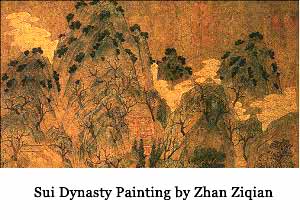
After successfully ascending the throne, Yang Guang began to reveal the true self, a brutal, incompetent, and indulgent one. In 611, the peasant uprisings broke out everywhere in the country, and the Sui Dynasty fell into a precarious situation. However, the insensitive Emperor Yang still kept his indulgent lifestyle and exploited people. In 616, when he began his second travel to southern China, Emperor Yang lost his base camp. Two years later, the emperor was killed by the very general he appointed in Jiangdu (today’s Yangzhou). Sui Dynasty came to an end after only 38 years of governing.
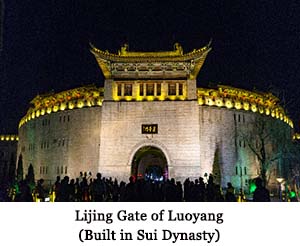
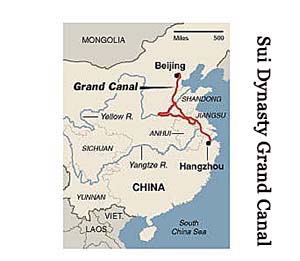 south and north China. However, the project was too massive and made people’s lives miserable. Also, Emperor Yang liked to travel south for pleasure. He made two journeys to south China and laid heavy burdens on people every time.
south and north China. However, the project was too massive and made people’s lives miserable. Also, Emperor Yang liked to travel south for pleasure. He made two journeys to south China and laid heavy burdens on people every time.
The construction of the Grand Canal has always been a shame in the history of the Sui Dynasty. However, the construction of the Grand Canal was more beneficial in the long run.
8 Days In-depth Silk Road Culture Tour to Dunhuang and Zhangye
6 days Shanghai -Suzhou - Hangzhou Trip
Copyright © 2019 Lily Sun China Tours International, Inc. Terms &conditions | Privacy Policy | Sitemap